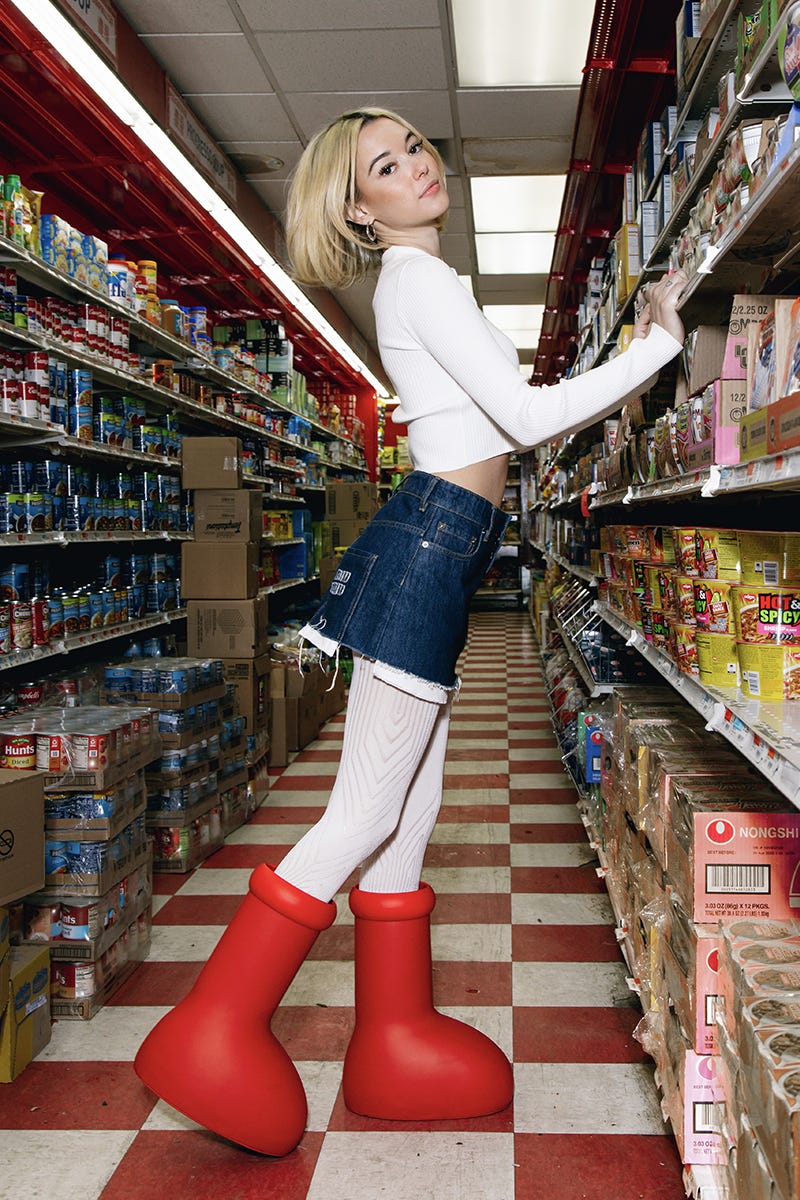My son turned 13 this past summer and it’s like somebody swapped out the actor overnight, like a Nathan Fielder sketch. One day, he was a child, playing with his die-cast Thomas the Train toys and ordering chicken tenders at a Mexican restaurant. The next, everything starts with “Bruh” and ends with, “You just don’t get it!”
Another thing that stands out (aside from the alien deep voice and cutting snark) is he’s always asking, “Actually?”
“Hey, get your shoes on, we’re gonna be late to your game.”
“Actually?”
“I guess there’s some type of Chinese weather balloon spying on us?”
“Actually, Dad, actually?”
There’s always a sliver of doubt holding reality and hoax apart. Sure, maybe it’s just his age as he happens upon the subversive wonders of sarcasm and irony. Anything serious is to be mocked or scoffed at. Life is a hollow meme, the Nelk boys are icons, and presidents are rodeo clowns.
I can’t blame my son’s skepticism. The world is becoming more unbelievable by the day. Weather patterns are haywire. This week, New Hampshire recorded a -109 degree day, the coldest temperature in our nation’s history. Meanwhile, a “warmer, wetter, sicker world” may lead to a fungal apocalypse that rivals the plotline of popular HBO show, “The Last of Us.”
Nature is being unnatural, but the boundary between truth and fiction is eroding in society as well. A round-the-clock news cycle, exploded across farms of social media accounts, must strive for more attention-grabbing headlines than ever. The Buzzfeed clickbait titles of the 2010s were playground fodder. It’s not enough to ensnare you with dramatized storylines of celebrity couples and pop culture listicles of your favorite Spice Girls. We’ve become desensitized to the shiny objects and dangling carrots; we must now be bagged and hit over the head with a shovel. The scareheads scream existential crises and bombard us with relentless threats of the world’s end. Lenticular clouds hover over Turkey mere days before a merciless earthquake takes its toll. The disintegrating relationship with China inches us closer to catastrophic war. And an AI Seinfeld show got banned from Twitch for a transphobic/homophobic stand-up routine.
“Actually, Dad, actually?”
Socially, it’s getting more difficult to discern the genuine from the performative. If engagement is rewarded to the most extreme and absurd, then social media’s contestants will exercise the most ridiculous behavior. Do the Grammys recipients think their outfits are designed well or are they competing to become the most memeworthy? The hottest shoe this week is the MSCHF Astro Boy boot. Do the streetwear Instagrams sincerely respect the shoe or are they just capitalizing on the social virality of the product? It’s probably both. Is the MSCHF shoe real? Is it a troll? Does it matter? We just want to know: “Actually?”
When Logan Paul teased a special announcement with Dana White on his socials, the inference was that he was fighting in the UFC. 24 hours later, it turned out he was signing an endorsement with his beverage brand. Actually. My son was disappointed to hear this, but as you can guess, he was adequately braced for the Internet ploy (He was born in the generation of social marketers, where everybody is shilling something (even themselves)). There’s a slang term to capture this attitude of soft untruths. “That’s cap.”
Face filters are cap. Braggadocious rapper claims are cap. Even Jonah Hill’s and Lauren London’s kiss in You People was cap!
Speaking of which, generative AI and deepfakes will only make it more complicated to believe people. Regardless, the human subjects they’re based on may be just as untrustworthy. George Santos, the New York representative, is like that one person we all know who tells outlandish lies for no reason (like his mom was in the World Trade Center on 9/11, that he wasn’t a drag queen, or that he guest starred on Hannah Montana (?!)). Mere moments ago, Marjorie Taylor Greene interrupted President Biden’s State of the Union address by yelling, “Liar!” I mean, liars are television gold these days: Elizabeth Holmes with Theranos, Adam Neumann of WeWork, Anna Delvey, the con artist who convinced New York’s social scene that she was a German heiress.
A few weeks ago, it was revealed that JPMorgan paid $175 million for a fintech company with a fake email list. What about SBF and FTX? NFTs are a scam? How about $300 mystery boxes at sneaker conventions? Retirees are losing their life savings to romance scams. A 19-year-old Tik Toker chronicled a fake cancer story, raising almost $40,000 for a bogus GoFundMe. I almost forgot the hundreds of billions of taxpayer dollars lost to pandemic relief fraud.
Social trust is evaporating across the board. In a 2019 survey, 71% of Americans thought interpersonal confidence had worsened in the past 20 years. Almost half stated that people aren’t as reliable as they used to be. When personal faith in each other declines, social order follows. We don’t trust the health experts, the government, and other institutions, we don’t trust the people we work for, we don’t even trust our friends. It makes perfect sense why paranoia and conspiracy theories fill the void where firm truths used to stand. When my son asks, “Actually?,” he’s looking for a stable stone to step on as he traverses the river of life.
The current is tumultuous, the muddy floor beneath is shifting. It’s like walking through a narrow hallway in an earthquake and our hands are looking for anything sturdy to hold onto. It’s why I admire people who hold steadfast to their commitments, no matter how big or small. They are human handrails, planted and guiding. When we agree to a lunch and they’re there, on time, that’s a show of faith in the friendship. When socially conscious people practice what they preach, and aren’t just in it for the political points, my respect balloons. It’s a real rarity for people to honor their word these days, so I cherish it that much more when they do. They are dependable ballasts in fickle and uncertain waters.
It’s also why I have a great appreciation for artists who build repertoires. And why I have deep respect for founders who create brands. When nothing is real or set in stone, when culture is chasing FOMO and fast money, there aren’t many places – or people - left where we can look to for consistency and truth. Great brands are some of the last bastions. If you think about it, disciplined artists and entrepreneurs show up every day to cultivate and develop their brand. For many, it’s not just a routine job. Beyond an investment, it’s a diligent relationship with the work. It’s commitment. They take it seriously. And that means they are taking you, the patron, the customer, seriously.
Everything is negotiable now. All the social vows are mushy. We’ve gotten into a horrible habit of pseudo-believing each other the way we take in the quasi-news and cheap marketing campaigns. Cancelling plans at the last minute, dropping the ball on a collaboration, making promises we can’t keep because it scores high on the algorithm and requires low effort. I don’t know if it’s because our moral compass has been knocked loose or the Internet is facilitating the fakeness, but I’d like to get back to believing in things again. And we can start by believing each other.
Talk about commitment. As I finish writing tonight, LeBron James has just set the NBA all-time scoring record with 38,388 points over 20 seasons of playing basketball. Actually.









Nice take. I think about this way too much. I think the one point that needs to be a part of this discussion is not just how skeptical we are, but how much of what we believe is determined by what we want (or think we want) to believe, and how the media landscape has (d)evolved and fractured to coddle our biases rather than challenge them.
Similar to @Christopher in the comments, I've thought about this often as well. Trust is dwindling and I see it at the local community level also. We are far from the days of asking neighbors for a bit of sugar or simply making an effort for one another. Robert Putnam has shared his work around this many years ago and it all comes down to trust. How do you trust people, institutions, those in service if you can't trust them?
However, it leads me to believe that there is still impact in wanting that type of community whether at the macro or micro scale. It's up to us to create what we seek. Does it take work? Yes ! Is it worth it? Absolutely!